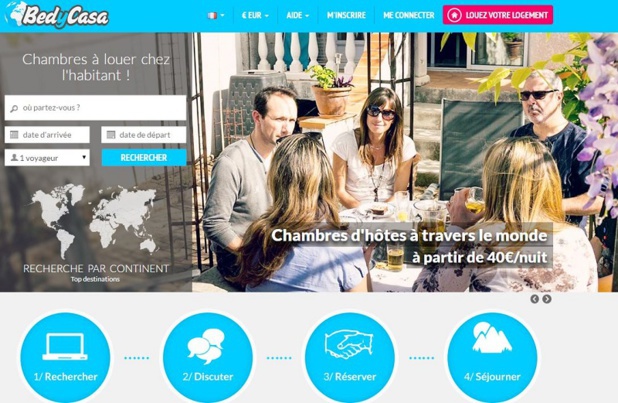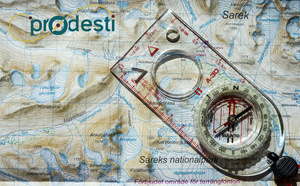
Magali Boisseau, founder of Bedycasa, a French platform of people to people accommodation rental, is open to negotiating with the distribution sector. ©Bedycasa
Renting a room in someone’s home, car rental between individuals could also work with the traditional distribution sector.
Some have already taken that step.
Such as the outsider, François Piot, CEO of the group Prêt-à-partir.
An agency in his network sells Airbnb services.
“These are one-time tests, we offer that as an alternative option for weekends in a European capital,” he relates.
Is he making a pact with devil, the company that made 3 million French citizens travel since 2008, that has over 1 million offers listed all over the world, and that doesn’t pay its taxes in France?
François Piot justifies himself: “In the province, the demand does not come from our clients but this enables us to be a force of bringing forward proposals.
And it is very advantageous in terms of prices. For one weekend, the budget can be reduced to half for a stay in a private home.”
Some have already taken that step.
Such as the outsider, François Piot, CEO of the group Prêt-à-partir.
An agency in his network sells Airbnb services.
“These are one-time tests, we offer that as an alternative option for weekends in a European capital,” he relates.
Is he making a pact with devil, the company that made 3 million French citizens travel since 2008, that has over 1 million offers listed all over the world, and that doesn’t pay its taxes in France?
François Piot justifies himself: “In the province, the demand does not come from our clients but this enables us to be a force of bringing forward proposals.
And it is very advantageous in terms of prices. For one weekend, the budget can be reduced to half for a stay in a private home.”
“70% of Internet users think about using collaborative services in 2015”
According to Valérie Boned, Deputy General Secretary of the SNAV, there is no legal obstacle towards reselling such services.
“There should at least be an adapted professional and civil liability insurance," she adds.
On its part, the brand Comptoir des voyages also didn’t wait for some kind of authorization to offer people-to-people accommodations rentals.
“We reserve directly on Airbnb, just like we do for Ryanair. And we add an extra service like breakfast for instance. This offer is in line with our brand’s philosophy, immersion trips, and affordable rates,” explains Jean-François Rial, CEO of Voyageurs du monde.
During the trade-fair Next Tourisme, Marc Lolivier, Executive Director of the Fevad announced that “70% of Internet users think about using collaborative services in 2015. This is not just a trend. It is undeniably a societal phenomenon.”
Have these collaborative services become unavoidable for the tourism sector? Should we question and revisit our business models? This question is starting to flourish in the travel sector.
“There should at least be an adapted professional and civil liability insurance," she adds.
On its part, the brand Comptoir des voyages also didn’t wait for some kind of authorization to offer people-to-people accommodations rentals.
“We reserve directly on Airbnb, just like we do for Ryanair. And we add an extra service like breakfast for instance. This offer is in line with our brand’s philosophy, immersion trips, and affordable rates,” explains Jean-François Rial, CEO of Voyageurs du monde.
During the trade-fair Next Tourisme, Marc Lolivier, Executive Director of the Fevad announced that “70% of Internet users think about using collaborative services in 2015. This is not just a trend. It is undeniably a societal phenomenon.”
Have these collaborative services become unavoidable for the tourism sector? Should we question and revisit our business models? This question is starting to flourish in the travel sector.
A differentiating factor
Selectour Afat is in fact leading a debate around this topic.
“In terms of the VTC, the network is looking at the main players in the market in order to identify those who would better respond to our business travel problematics. Such as the integration of our tools, service quality, rate conditions, territorial implantation…”, observes Edouard Roux de Lusignan, E-commerce Director of Selectour Afat.
“The problem will be with the business model,” adds the Deputy General Secretary of SNAV.
François Piot, on his end, decided to pay himself on the sale of dynamic packages with a 15% commission.
In the upcoming months, he should meet with Bedycasa, a French rival of Airbnb.
Magali Boisseau, the founder, is open to negotiating with the distribution sector. Contrarily to Airbnb who does not even consider any BtoB partnerships.
“Selling collaborative accommodation enables agencies to differentiate themselves from online agencies.
Furthermore, these types of stays are three times less expensive than traditional hotels.”
Before signing on partnerships (a new partnership with a European group being underway), the representative of French Tech, who created her company almost one year before Airbnb, first wants to be profitable. “We’re almost there,” she rejoices.
“In terms of the VTC, the network is looking at the main players in the market in order to identify those who would better respond to our business travel problematics. Such as the integration of our tools, service quality, rate conditions, territorial implantation…”, observes Edouard Roux de Lusignan, E-commerce Director of Selectour Afat.
“The problem will be with the business model,” adds the Deputy General Secretary of SNAV.
François Piot, on his end, decided to pay himself on the sale of dynamic packages with a 15% commission.
In the upcoming months, he should meet with Bedycasa, a French rival of Airbnb.
Magali Boisseau, the founder, is open to negotiating with the distribution sector. Contrarily to Airbnb who does not even consider any BtoB partnerships.
“Selling collaborative accommodation enables agencies to differentiate themselves from online agencies.
Furthermore, these types of stays are three times less expensive than traditional hotels.”
Before signing on partnerships (a new partnership with a European group being underway), the representative of French Tech, who created her company almost one year before Airbnb, first wants to be profitable. “We’re almost there,” she rejoices.
What do the players of the collaborative economy think about that?
While private accommodation rental could have its spot inside travel agencies, the transport sector seems to be more complicated.
For Blablacar, a paying community platform of carpooling, this is not even a conceivable option.
“Carpooling is a relationship between two people. Intermediation is not possible. Our profit margins are just too weak, 2.50 euros.
Until 2010, we had tested a BtoB business model, but it was too time-consuming,” describes Laure Wagner, Communications Director.
However, since April 4th, 2015, Blablacar is featured on the Liligo website. “We hope to get closer to flight comparators,” she reveals.
Paulin Dementhon, founder of Drivy, a platform of car rental between individuals, shares the same vision as Blablacar: “I envision having a digital intermediary through an API, a new technology that will be available this year.
For example, Drivy could be displayed on the Voyages-SNCF so that a traveler could rent a car at the destination.”
Do they perceive the travel agency more as an obstacle in the value chain?
Their goal is at least clear: put two people in contact, where a trusting relationship is key. During this development stage, the travel agent is out of the question.
For Blablacar, a paying community platform of carpooling, this is not even a conceivable option.
“Carpooling is a relationship between two people. Intermediation is not possible. Our profit margins are just too weak, 2.50 euros.
Until 2010, we had tested a BtoB business model, but it was too time-consuming,” describes Laure Wagner, Communications Director.
However, since April 4th, 2015, Blablacar is featured on the Liligo website. “We hope to get closer to flight comparators,” she reveals.
Paulin Dementhon, founder of Drivy, a platform of car rental between individuals, shares the same vision as Blablacar: “I envision having a digital intermediary through an API, a new technology that will be available this year.
For example, Drivy could be displayed on the Voyages-SNCF so that a traveler could rent a car at the destination.”
Do they perceive the travel agency more as an obstacle in the value chain?
Their goal is at least clear: put two people in contact, where a trusting relationship is key. During this development stage, the travel agent is out of the question.
A scenario that has potential
The Snav does not want to miss out on the revolution of collaborative tourism, and insists on valorizing the added value of a travel agent to these new players.
“Remember, Ryanair had said that agencies were “dead wood.”
The players of the collaborative economy don’t have the arrogance that low-costs companies had in their beginnings, they are much more pragmatic.
They may change their mind once they’ll be looking for new sources of growth,” reminds Jean-Pierre Mas, President of the Snav.
On his part, François Piot is already convinced: “These services will enter agencies. The client may purchase online, but he needs to be reassured.”
He is currently thinking of developing an application to organize his stays with…the collaborative sector.
“We’re shareholders of the group Lounge Up,” a company that created smartphone applications to inform and interact with clients before, during, and after a stay.
“With them, I definitely see a means of optimizing the stay on location by offering excursions, great deals… But also renting a car in a group, reserve a trip as a group to benefit from better rates…”
Olivier Roche, E-commerce Director of TUI France, does not restrict himself from including services from these new Internet platforms.
“We could add additional services, such as renting a boat between individuals through SamBoat.”
“There is still everything to invent,” proclaims Valérie Boned.
“The travel agent could be at the intersections of these different routes. He could even rent his client’s home when going on vacation!”
“Remember, Ryanair had said that agencies were “dead wood.”
The players of the collaborative economy don’t have the arrogance that low-costs companies had in their beginnings, they are much more pragmatic.
They may change their mind once they’ll be looking for new sources of growth,” reminds Jean-Pierre Mas, President of the Snav.
On his part, François Piot is already convinced: “These services will enter agencies. The client may purchase online, but he needs to be reassured.”
He is currently thinking of developing an application to organize his stays with…the collaborative sector.
“We’re shareholders of the group Lounge Up,” a company that created smartphone applications to inform and interact with clients before, during, and after a stay.
“With them, I definitely see a means of optimizing the stay on location by offering excursions, great deals… But also renting a car in a group, reserve a trip as a group to benefit from better rates…”
Olivier Roche, E-commerce Director of TUI France, does not restrict himself from including services from these new Internet platforms.
“We could add additional services, such as renting a boat between individuals through SamBoat.”
“There is still everything to invent,” proclaims Valérie Boned.
“The travel agent could be at the intersections of these different routes. He could even rent his client’s home when going on vacation!”

























![Chine : l'Année du Cheval de Feu fait chauffer les compteurs du tourisme [ABO] Chine : l'Année du Cheval de Feu fait chauffer les compteurs du tourisme [ABO]](https://www.tourmag.com/photo/art/large_16_9/94556459-65997162.jpg?v=1771331363)















